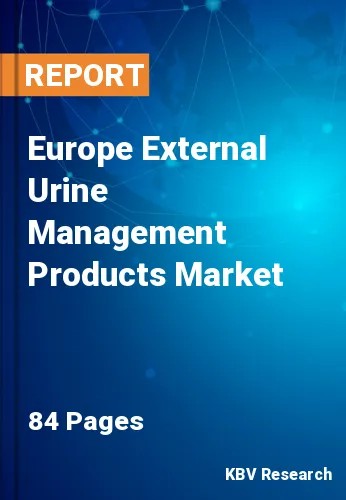The Europe External Urine Management Products Market would witness market growth of 4.8% CAGR during the forecast period (2022-2028).
Urinary incontinence and insufficient bladder emptying are managed with the use of internally and externally urinary catheters. The source of the bladder malfunction determines whether a short- or long-term catheterization is necessary and whether an implantable, periodic, or external catheter should be used as a result. Depending on the fundamental bladder ailment, treatment objectives, and gender appropriateness, the catheterization technique is chosen.
When using an indwelling catheter, the duration of the catheter should be as short as possible to ensure patient safety and comfort. It is important to recognize that complications like infection and its sequelae are directly related to catheter use for a long period. In order complications, some more recent catheter systems have coatings. The most common complications related to indwelling catheters are encrustations, urethral trauma and erosion, bladder stones, and bladder cancer, as well as epididymitis in men.
Urine incontinence (UI) and urinary retention are the two main bladder dysfunctions that are treated using catheters (UR). Urinary incontinence is the unintentional loss of urine and can be categorized as either stress incontinence (urinary leakage with activity or effort, such as coughing, laughing, or overflowing) or urgency incontinence (urine loss following immediacy and associated with overactive bladder illnesses of urgency and frequency).
There are now half a million people in the UK who are 90 years or older, more than twice as many as there were in 1985 due to an increase in the average life expectancy over the past few decades. By 2035, it's expected that more than half of British inhabitants would be 50 or older. However, there hasn't been a corresponding rise in life expectancy to go along with these gains. The difference in average longevity between England's poorest and richest regions has substantially increased during the past few years. From 9.0 years in 2011 to 2013 to 9.4 years in 2017 and 2019, it increased for males.
The Germany market dominated the Europe External Urine Management Products Market by Country in 2021, and would continue to be a dominant market till 2028; thereby, achieving a market value of $48 million by 2028. The UK market is anticipated to grow at a CAGR of 3.9% during (2022 - 2028). Additionally, The France market would display a CAGR of 5.6% during (2022 - 2028).
Based on Distribution Channel, the market is segmented into Offline and Online. Based on Product, the market is segmented into Male External Catheters, Female External Catheters, and Urine Collection Accessories. Based on End- use, the market is segmented into Hospitals, Clinics, Home Care Settings, and Others. Based on countries, the market is segmented into Germany, UK, France, Russia, Spain, Italy, and Rest of Europe.
Free Valuable Insights: The Global External Urine Management Products Market will Hit $752.5 Million by 2028, at a CAGR of 5%
The market research report covers the analysis of key stake holders of the market. Key companies profiled in the report include Becton, Dickinson and Company, B. Braun Melsungen AG, Sage Products LLC (Stryker Corporation), Teleflex, Inc., Cardinal Health, Inc., Consure Medical, Hollister, Inc., Coloplast Group, Tilla Care Ltd., and Sterimed Group.
By Distribution Channel
By Product
By End Use
By Country
Our team of dedicated experts can provide you with attractive expansion opportunities for your business.

